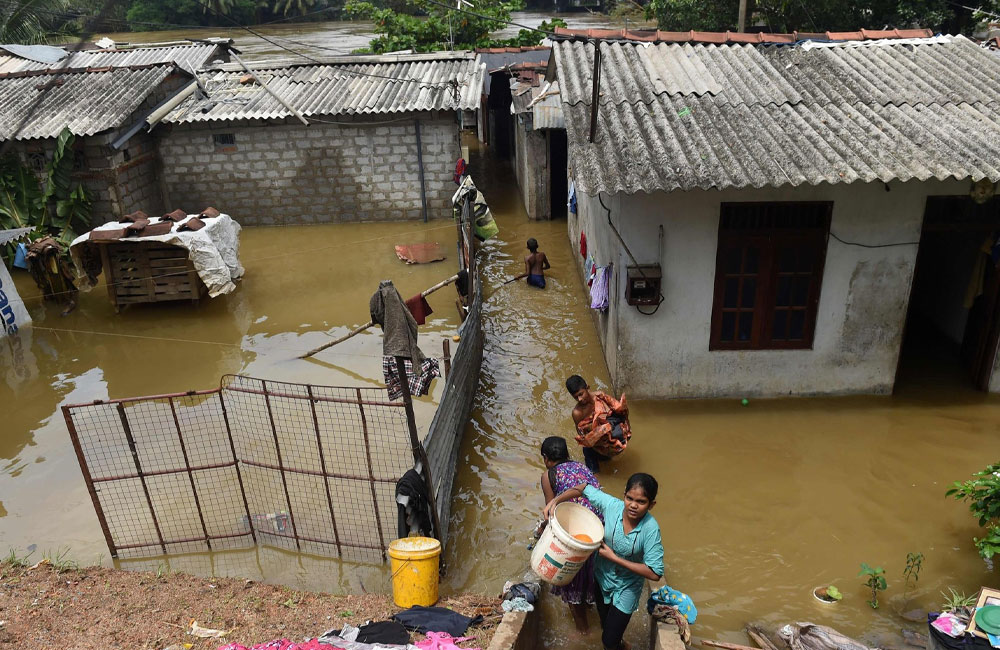News

RFI Request Only: Sri Lanka Needs Disaster Relief, Not New Bailout
Sri Lanka’s request for approximately US$ 200 million under the IMF’s Rapid Financing Instrument (RFI) should be understood strictly as urgent disaster relief — not the start of another long‑term bailout programme.
On December 5, 2025, the IMF confirmed that Sri Lanka had applied for SDR 150.5 million (roughly US$ 200 million, about 26 % of its quota) under the RFI, in response to severe economic and humanitarian fallout from Cyclone Ditwah.
The funds, if approved by the IMF Executive Board, would flow as a one‑off, rapid disbursement to address urgent balance-of-payments needs helping rebuild infrastructure, shore up foreign exchange, and stabilize the immediate economic shock.
This emergency facility (RFI) clearly differs from the ongoing Extended Fund Facility (EFF) arrangement that Sri Lanka signed in March 2023. Under that program, the country committed to medium-term structural reforms: fiscal consolidation, debt sustainability, restoring external buffers, controlling inflation, improving governance and social protection.
The EFF spans multiple years (48 months) and involves multiple reviews, milestones, and conditionalities closely monitored by the IMF.
Indeed, Sri Lanka has already drawn several tranches under the EFF. The third review concluded in early 2025 cleared a draw of SDR 254 million (about US$ 334 million), with the fourth review approving another SDR 254 million (about US$ 350 million).
These disbursements reflect a gradual but serious effort by Sri Lanka to stabilize the economy through structural adjustments.
In contrast, the RFI is designed for transitory, urgent shocks like a natural disaster or external shock — where the need is immediate, but does not require the full‑blown conditionality and long-term oversight that an EFF programme would entail.
The support comes without periodic reviews or long‑term reform obligations; once disbursed, the loan must be repaid within 3¼ to 5 years.
Given the scale and nature of the damage inflicted by Cyclone Ditwah affecting infrastructure, livelihoods, and triggering urgent balance-of-payments pressures a request under the RFI is appropriate. It allows Sri Lanka to mobilize foreign exchange quickly for relief and reconstruction, without derailing or complicating the structural program already in place under the EFF.
Indeed, the IMF itself appears to treat the RFI request as an addition to, not a substitute for, existing EFF access. Reports say the Board will prioritize the RFI review, and only then resume the fifth EFF review when conditions permit.
In the delicate aftermath of a disaster, clarity matters. Presenting this RFI request as a distinct, one-time emergency intervention not a new multi‑year programme will preserve the integrity of Sri Lanka’s structural reform path. That clarity is also vital for public confidence and for reassuring international creditors that reform commitments under the EFF remain intact.
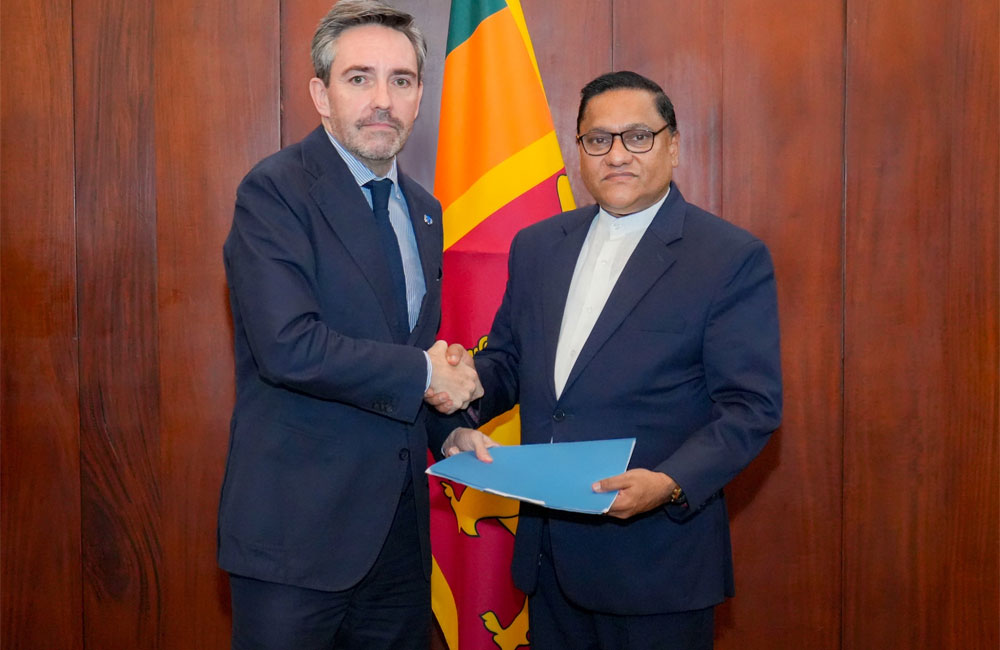
UN Pledges US$4.5 Million for Sri Lanka’s Disaster Recovery
Sri Lanka will receive full support from the United Nations (UN) for recovery and reconstruction following the recent extreme weather disaster, the UN Resident Representative in Sri Lanka Marc-André Franche said on Monday.
He made the pledge during a meeting with Foreign Minister Vijitha Herath at the ministry.
Marc-André Franche said the UN has decided to provide an initial US$ 4.5 million under its Emergency Response Fund to support immediate relief for affected communities. The amount was symbolically handed over to Minister Herath during the meeting.
According to the UN, the financial and technical assistance will focus on food security, housing, drinking water, education, health, agriculture and fisheries.
Marc-André Franche further noted that a five-member team from the UN Office for the Coordination of Humanitarian Affairs (OCHA) has already arrived in Sri Lanka to conduct a detailed assessment of needs. The UN expects to work closely with Sri Lanka’s Disaster Management Centre for all related coordination.
Minister Herath pointed out that the disaster has severely affected the country’s population, economy, agricultural sector and essential infrastructure, and emphasized the importance of international cooperation for national recovery efforts.
The Resident Representative said the UN will continue working with its offices in New York and Geneva to facilitate support from international partners contributing to Sri Lanka’s rebuilding programme.

Sri Lanka Export Shortfall + Reserve Crisis: $1 Billion Missed Target
Sri Lanka is poised to fall short of its 2025 export revenue target by nearly US$ 1 billion, highlighting vulnerabilities in both the economy and its external financial buffers. The Export Development Board (EDB) projects total exports for the year to reach between US$ 17-17.5 billion, below the planned US$ 18.2 billion.
The shortfall stems primarily from severe domestic disasters, including floods and storms, which have disrupted agriculture and production, alongside global market pressures.
 Source - aljazeera
Source - aljazeera
Over the first ten months of 2025, merchandise and services exports collectively amounted to US$ 14.4 billion. While this reflects a 6% growth over the previous decade considered a notable improvement it remains insufficient to meet targets and address structural weaknesses in the export sector.
The underperformance has implications far beyond the headline numbers, as Sri Lanka relies heavily on export earnings to sustain foreign-exchange inflows, stabilize the currency, and maintain macroeconomic stability.
The export shortfall coincides with the country’s ongoing effort to rebuild reserves under the International Monetary Fund (IMF) Extended Fund Facility. Authorities have indicated a gross official reserve projection of around US$ 7 billion by the end of 2025.
However, experts clarify that this figure is a projection rather than a mandatory requirement. What truly matters is the accumulation of Net International Reserves (NIR) fully liquid, internationally recognized foreign assets excluding conditional swap lines.
For instance, approximately US$ 1.4 billion in swap agreements included in headline reserve figures are not immediately available for international obligations, meaning actual usable reserves are lower than publicized.
The shortfall in export revenue directly constrains the country’s ability to maintain these reserves. Reduced inflows limit Sri Lanka’s capacity to finance imports, service external debt, and support a stable exchange rate.
Analysts warn that without corrective measures, the combined effect of weaker exports and uncertain reserve liquidity could exacerbate currency volatility and inflationary pressures, deepening macroeconomic fragility.
In response, the EDB is pursuing structural reforms through the upcoming National Export Development Plan (NEDP) for 2026–2030.

The strategy includes diversifying export products beyond traditional commodities like apparel, tea, and rubber, developing high-potential sectors such as ICT/BPM, logistics, electronics, and mineral-based exports, and targeting new regional markets in Africa, Asia, and the Middle East. Strengthened economic diplomacy and modernization of trade processes, including online integration via the National Single Window, are expected to bolster resilience.
But , analysts caution that achieving these ambitious goals requires careful alignment of policy, investment, and disaster preparedness.
The recent export shortfall underscores the fragility of Sri Lanka’s current external position and the urgent need to ensure that growth targets are realistic and supported by resilient, disaster-proof economic infrastructure.
The missed US$ 1 billion export target may be a temporary setback, but its ripple effects on reserve adequacy, currency stability, and investor confidence make it a critical warning for policymakers and the business community alike.
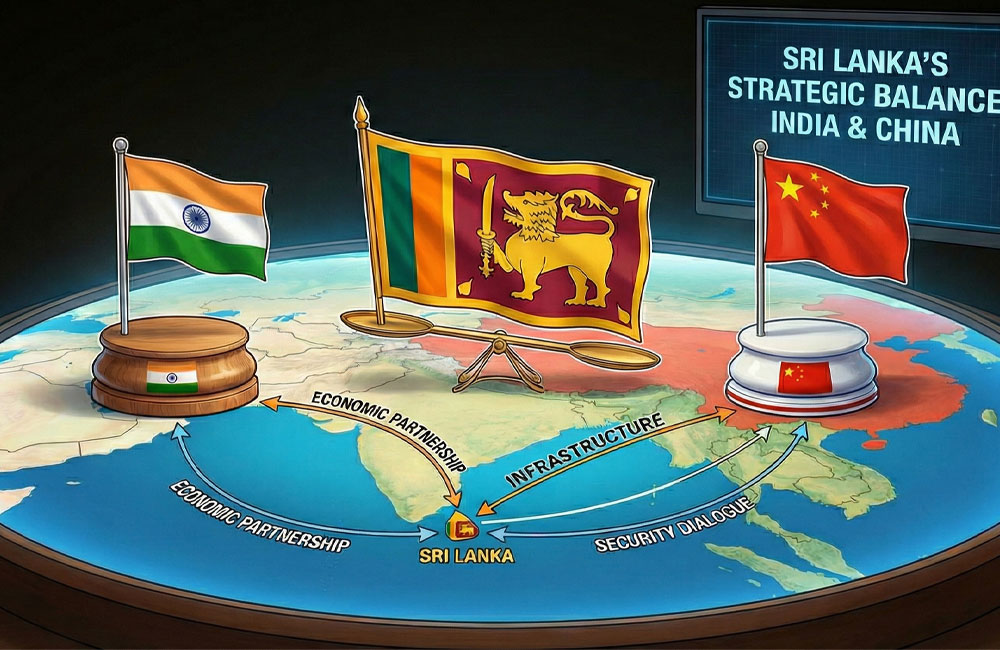
Cyclone Recovery Tests Sri Lanka’s Strategy between India and China
As Sri Lanka struggles to recover from the devastation of Cyclone Ditwah and weeks of flooding, a deeper question is emerging beneath the emergency headlines: How should Sri Lanka balance urgent rescue needs with the long-term risks of foreign-funded reconstruction?
The answer is becoming inseparable from the geopolitical rivalry between India and China, the region’s two largest economic powers, both now active in Sri Lanka’s disaster response but in very different ways.
India moved with striking speed. Under Operation Sagar Bandhu, New Delhi deployed a multidimensional humanitarian package within hours, sending 53 tonnes of relief supplies, three Indian Air Force aircraft, naval vessels, specialised National Disaster Response Force (India) NDRF search-and-rescue units, and medical teams.
Helicopters airlifted stranded residents, engineers restored broken access routes, and evacuation flights repatriated more than 2,000 Indian nationals while also contributing to broader relief operations. India’s footprint is unmistakably operational: boots, machinery, helicopters, and emergency workers on the ground.
China’s engagement so far has been different in scale and style. Beijing’s immediate support included US$100,000 from the Red Cross Society of China to the Sri Lanka Red Cross, while embassy-linked community groups mobilised another LKR 10 million in donations.
Official Chinese statements indicate that further supplies and government-level assistance are “in progress” or being arranged. While not matching the rapid deployment seen from India, China’s approach fits its established pattern: financial aid first, reconstruction financing and project-based support later.
These contrasting relief models hint at a more complex reality Sri Lanka’s vulnerability is not just humanitarian, but geopolitical.
India’s swift operations reinforce its declared role as the Indian Ocean’s “first responder”, a strategic message that Colombo cannot ignore.
The tangible, highly visible nature of its assistance builds goodwill at the community level and strengthens defence and emergency cooperation. For a country still in economic recovery, Indian High Availability Disaster Recovery HADR capabilities provide immediate, lifesaving relief without adding to debt.
China’s influence, however, lies in long-term infrastructure and financing, from energy projects to major transport and port-related ventures. Beijing’s reconstruction assistance when it comes could offer scale and speed unmatched by most donors.
But these advantages come with well-known policy sensitivities: debt sustainability, project transparency, and environmental resilience. Post-disaster spending can easily become a gateway for high-cost or strategically weighted projects if oversight is weak.
This leaves Sri Lanka with a difficult but decisive task: extract benefits from both partners without deepening structural vulnerabilities.
In the immediate term, the country must continue leveraging India’s operational strength rescue teams, engineering units, medical care, and connectivity restoration because these are capabilities China does not deploy at the same pace or magnitude.
But for the reconstruction phase, Colombo must draw strict red lines: infrastructure must meet resilience standards, financing terms must be transparent, and project selection must prioritise flood protection, early warning capacity, agriculture stability, and social infrastructure.
If Sri Lanka does not set the terms, others will. The coming months will determine whether foreign financing becomes a tool for rebuilding a safer, greener nation or a new layer of long-term dependency shaped by the strategic calculus of external powers.
For a country caught between two giants, the only sustainable path is disciplined neutrality: accept the help, but guard the future.

IndiGo refunds tickets worth INR 6.1 billion, on-time flight ops improve
IndiGo is on track to operate over 1,650 flights, up from 1,500 yesterday, the airline said in a status update this evening. It said 137 out of 138 destinations are in operation with on-time performance of 75 per cent, up from 30 per cent yesterday.
The airline iterated it will give full waiver on cancellations and reschedule requests for bookings till December 15. The process of refunds and sorting luggage is going on fast, it said.
“We are working round the clock to resume normal service. Please bear with us,” IndiGo said in its latest status update today.
The Ministry of Civil Aviation (MoCA) has taken rapid and decisive steps to address the disruption caused by IndiGo’s operational crisis and to ensure that passengers do not face continued inconvenience, officials said.
Air travel operations across the country are stabilising at a fast pace as all other domestic airlines are operating smoothly and at full capacity, while IndiGo’s performance has shown steady improvement today, with flight schedules moving back towards normal levels, they said.
Airfare Regulation To Prevent Overcharging
In light of recent cancellations leading to a shift in demand and temporary surge in airfares, the ministry intervened and introduced a cap on airfares with immediate effect. This measure ensures fairness and affordability for travellers, officials said.
Since the implementation of this order, fare levels across affected routes have moderated to acceptable limits. All airlines have been instructed to comply strictly with the revised fare structure, they said.
Passenger Refunds And Rescheduling Support
To ensure financial protection for passengers, the ministry issued strict directives to IndiGo requiring that all refunds for cancelled or severely delayed flights be completed by 8 pm today. IndiGo has so far processed refunds totalling INR 6.1 billion.
No additional fees are permitted for rescheduling travel impacted by cancellations. Dedicated support cells have been created to proactively assist passengers so that refund and rebooking issues are resolved without delay or inconvenience.
Baggage Reconciliation And Delivery
The ministry has instructed IndiGo to trace and deliver all baggage separated from passengers due to disruptions within 48 hours. Continuous communication is mandated throughout the process. With this push, IndiGo has successfully delivered 3,000 pieces of baggage to passengers across India as of yesterday.
Airport Operations And On-Ground Facilitation
Airport directors from Delhi, Mumbai, Bengaluru, Chennai, Hyderabad, Ahmedabad, and Goa have confirmed normal conditions across terminals today. Passenger movement remains smooth with no crowding at check-in, security, or boarding points, officials said.
On-ground support has been strengthened through enhanced monitoring and timely deployment of assistance by airport operators and CISF.
Real-Time Monitoring And Control Measures
The MoCA’s 24x7 control room continues to function as an integrated coordination hub, overseeing flight operations, airport conditions, and passenger support requirements. Passenger calls are being promptly attended to, with necessary assistance as required. Our teams remain deployed on the ground to supervise operational planning, crew rostering, and passenger handling standards, ensuring full compliance.
Reassurance To Passengers
The Ministry of Civil Aviation said it wishes to reassure the travelling public that passenger safety, convenience, and dignity remain the highest priority of the government. The aviation network is moving swiftly toward full normalcy, and all corrective measures will remain in place until operations stabilize entirely, it said.
The ministry will continue vigilant monitoring to ensure full protection of passenger rights and interests, and further updates will be shared as required.
( Source : adaderana.lk)

Amber Alert Issued as Heavy Rain Exceeding 100 mm Expected
The Department of Meteorology has issued an Amber advisory, warning that certain areas of the country could receive more than 100 millimeters of rainfall within the next 24 hours. The alert comes as northeast monsoon conditions continue to establish themselves across the island.
According to the department, intermittent showers or thunderstorms are likely in the Northern, North-Central, Eastern, Central, and Uva provinces throughout the day. The highest rainfall- exceeding 100 mm-is expected in parts of the Northern, Eastern, and North-Central provinces.
Authorities advise the public to remain vigilant and take necessary measures to reduce potential impacts from heavy rain, gusty winds, and lightning that may accompany the thundershowers.

Cyclone Ditwah Threatens Maha Harvest, Sparks Food Security Fears
Sri Lanka’s agricultural heartland has been dealt a severe blow as Cyclone Ditwah struck at the peak of the country’s Maha season, inundating large stretches of farmland and placing the upcoming rice harvest at risk.
According to a Joint Rapid Needs Assessment by the United Nations and the Disaster Management Centre, 563,950 hectares of paddy sown by nearly 775,000 farmers were already at various stages of growth when the cyclone unleashed prolonged, intense rainfall.
The Maha season normally covers 800,000–850,000 hectares, making it the country’s most important cultivation cycle. However, vast areas are now submerged or heavily waterlogged, with officials warning of significant yield losses.
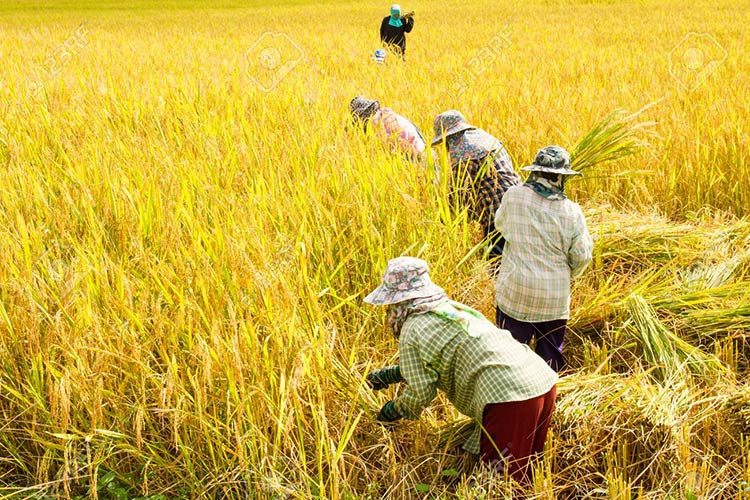
While paddy can tolerate short-term flooding, the extent of damage varies by growth stage; young seedlings in early-sown districts such as Ampara face the highest risk of complete destruction. Fields left underwater for days may see plants suffocate, while strong currents can sweep away newly sown plots or leave thick layers of sand, making resowing difficult.
Although time remains to replant in certain areas, the availability of seed paddy has emerged as a major concern. Stocks stored by farmers have also been damaged by flooding, raising fears that the country may struggle to recover the lost extent.
Sri Lanka’s long-criticised land regulations further complicate recovery: farmers are barred from planting alternative crops on paddy lands and are required to navigate a maze of permissions simply to remove sand deposited by floods. In past disasters, farmers noted they could have earned income by selling sand to contractors but only if the state authorised removal before weeds contaminated it.
Beyond rice, an estimated 95,799 hectares of other field crops including maize, pulses, bananas and 13,463 hectares of vegetables have sustained extensive flood damage. The Food and Agriculture Organization (FAO), together with the Department of Agriculture, is conducting field-level assessments to determine district-specific losses that will inform input support and livelihood restoration.

The cyclone’s fallout extends to the livestock sector. Heavy rains and collapsing shelters resulted in the drowning of cattle and poultry. Feed stocks, grazing lands, and water points have been damaged or contaminated, heightening the risk of disease outbreaks.
The report warns that disruptions to veterinary services, transport links, and breeding inputs could further undermine farmers’ ability to restart operations, threatening rural incomes and nutrition.
The fisheries and aquaculture sectors have also reported widespread destruction. Nearly 200 small boats and traditional crafts have been damaged, along with an undetermined number of multi-day vessels operating offshore.
Inland reservoirs suffered structural damage, leading to the escape of stocked fish. Aquaculture sites shrimp farms, ornamental fish units, seaweed and sea cucumber operations—have all incurred losses.
The potential economic and social consequences are profound. Losing a large portion of the Maha harvest could tighten domestic rice supply, push prices upward, and strain household food security. With thousands of farmers affected, the damage threatens to ripple through rural economies, weakening livelihoods at a time when the country cannot afford another shock.
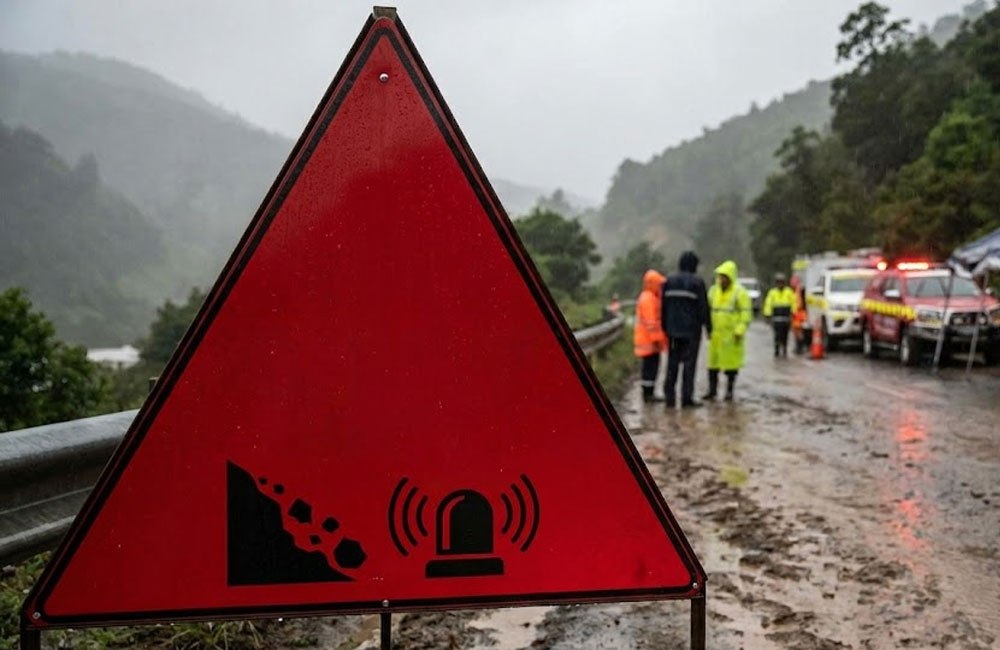
Red-Level Landslide Evacuation Orders Issued in Four Districts
The Disaster Management Center (DMC) has instructed authorities to evacuate families living in areas identified as highly vulnerable to landslides in the districts of Kandy, Kegalle, Kurunegala, and Matale. The directive comes after the National Building Research Organization (NBRO) issued Level 3 (Red) landslide warnings as heavy rainfall continues across several regions.
According to the DMC, the NBRO has mapped out numerous locations within the four districts where the likelihood of landslides has significantly increased, prompting urgent relocation measures. District Secretaries have been advised to move residents in these danger zones to designated safe centers from December 9 to 19.
Evacuation efforts will be carried out jointly by District Secretaries, NBRO officials, Divisional Secretaries, Grama Niladharis, the Sri Lanka Police, and other supporting agencies, the DMC said.
Areas Under Level 3 (Red) Landslide Warning
- Kandy District: Hatharaliyadda, Yatinuwara, Udadumbara, Pathahewaheta, Medadumbara, Pasbage Korale, Deltota, Poojapitiya, Ganga Ihala Korale, Panwila, Gangawata Korale, Udapalatha, Harispattuwa, Kundasale, Minipe, Doluwa, Thumpane, Akurana, Udunuwara, Pathadumbara, and nearby areas.
- Kegalle District: Kegalle, Galigamuwa, Mawanella, Bulathkohupitiya, Aranayaka, Yatiyanthota, Rambukkana, Warakapola, and surrounding regions.
- Kurunegala District: Mawathagama, Mallawapitiya, Rideegama, and adjacent areas.
- Matale District: Naula, Wilgamuwa, Pallepola, Ambanganga Korale, Laggala Pallegama, Ukuwela, Rattota, Matale, Yatawatta, and nearby locations.
Meanwhile, the Department of Meteorology reports that the gradual onset of the northeast monsoon will bring intermittent showers or thunderstorms today (09) across the Northern, North-Central, Eastern, Central, and Uva provinces. Deputy Director of Weather Forecasting & Disaster Management Meril Mendis added that these rainy conditions are likely to persist until December 19, 2025.

Mrs India Pageant Makes Landmark International Debut in Colombo
In a milestone for regional cultural relations and women’s empowerment, Mrs India Pride of the Nation, one of India’s most respected platforms celebrating married women, is set to stage its first-ever international Grand Finale in Colombo.
The Season 7 finale, scheduled for 11 December 2025 at the prestigious ITC Ratnadipa, marks the first time the pageant has stepped outside India, signalling its evolution into a global movement.
The event is being hosted with the support of the Sri Lanka Convention Bureau and SriLankan Airlines, whose collaboration has elevated the pageant’s international profile and positioned Sri Lanka as a warm and vibrant partner in this cultural celebration.
This strategic partnership also underscores both nations’ commitment to deepening cultural, social, and people-to-people connections.
This year’s edition carries increased significance as it unfolds over a week-long program in Colombo, welcoming more than 125 accomplished women from across India.
Participants will engage in tailored leadership sessions, grooming workshops, professional development training, and cultural immersion activities that aim to reflect the diversity of India while showcasing the hospitality and heritage of Sri Lanka.
The contestants represent a new generation of Indian womanhood—bold, compassionate, ambitious, and purpose-driven.
The Colombo platform will celebrate their strengths, identities, and personal journeys, shifting the spotlight beyond traditional beauty standards toward leadership, self-discovery, and empowerment.
Founder and Director of Mrs India Pride of the Nation and Glamour Gurgaon, Barkha Nangia, emphasised that the pageant has never been solely about glamour:
“Mrs India Pride of the Nation is a mission to help women rediscover their inner power and limitless potential.
Taking our Grand Finale to Sri Lanka proves that empowerment transcends borders. Every woman on our stage is a symbol of courage, transformation, and inspiration. This international edition is truly a celebration of global sisterhood.”

Over the years, the platform has evolved into a powerful social movement that highlights real stories and real women.
Thousands of participants have used the program to strengthen their identities, build confidence, and become role models in their families, workplaces, and communities. Season 7 seeks to extend this mission to an international audience, reinforcing the message that the spirit of empowerment knows no boundaries.
The Grand Finale is expected to be a vibrant blend of fashion, cultural expression, confidence, and storytelling. It will highlight the transformational journeys of all participants women who have embraced change, overcome challenges, and emerged stronger with renewed purpose.
As Mrs India Pride of the Nation takes its historic step onto Sri Lankan soil, the Colombo edition promises to serve as a bridge between two nations, celebrating unity, diversity, and the powerful shared values that define modern womanhood.
With compelling narratives, global partnerships, and world-class production, Season 7 is poised to create an unforgettable international chapter for the pageant one that celebrates women who bring their culture, confidence, and inspiration across borders.
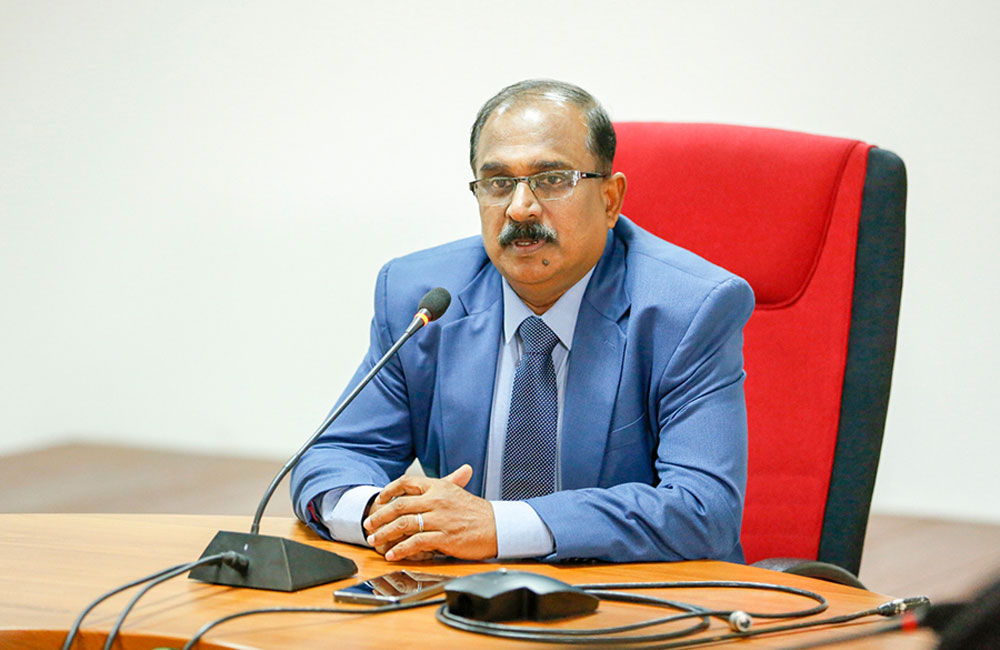
National-Level Committee Appointed To Coordinate Foreign Aid Distribution
The President has appointed a national-level committee to ensure the proper coordination of foreign aid distribution to affected communities.
Deputy Minister of Defence, Retired Major General Aruna Jayasekara made the announcement during a special media briefing held at the Disaster Management Centre.
The committee has been established under his chairmanship to oversee and streamline relief efforts.
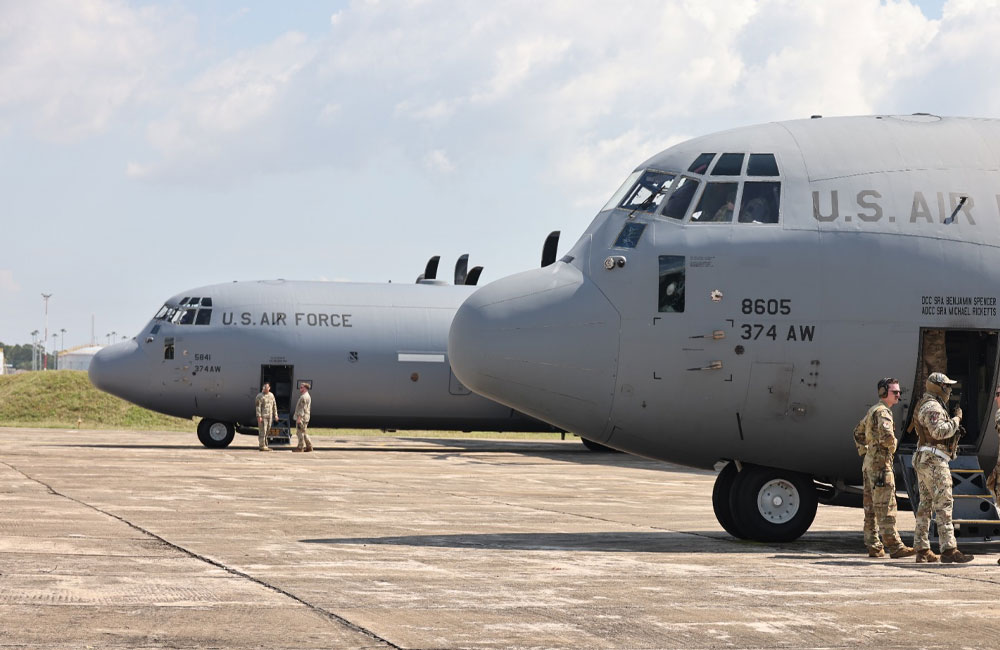
US Disaster Airlift Marks Sharp Shift from Past Secrecy
The arrival of two U.S. Air Force C-130J Super Hercules aircraft in Sri Lanka with full media visibility and an unusually high-profile diplomatic presence marks a striking departure from Washington’s historically discreet approach to military disaster assistance on the island.
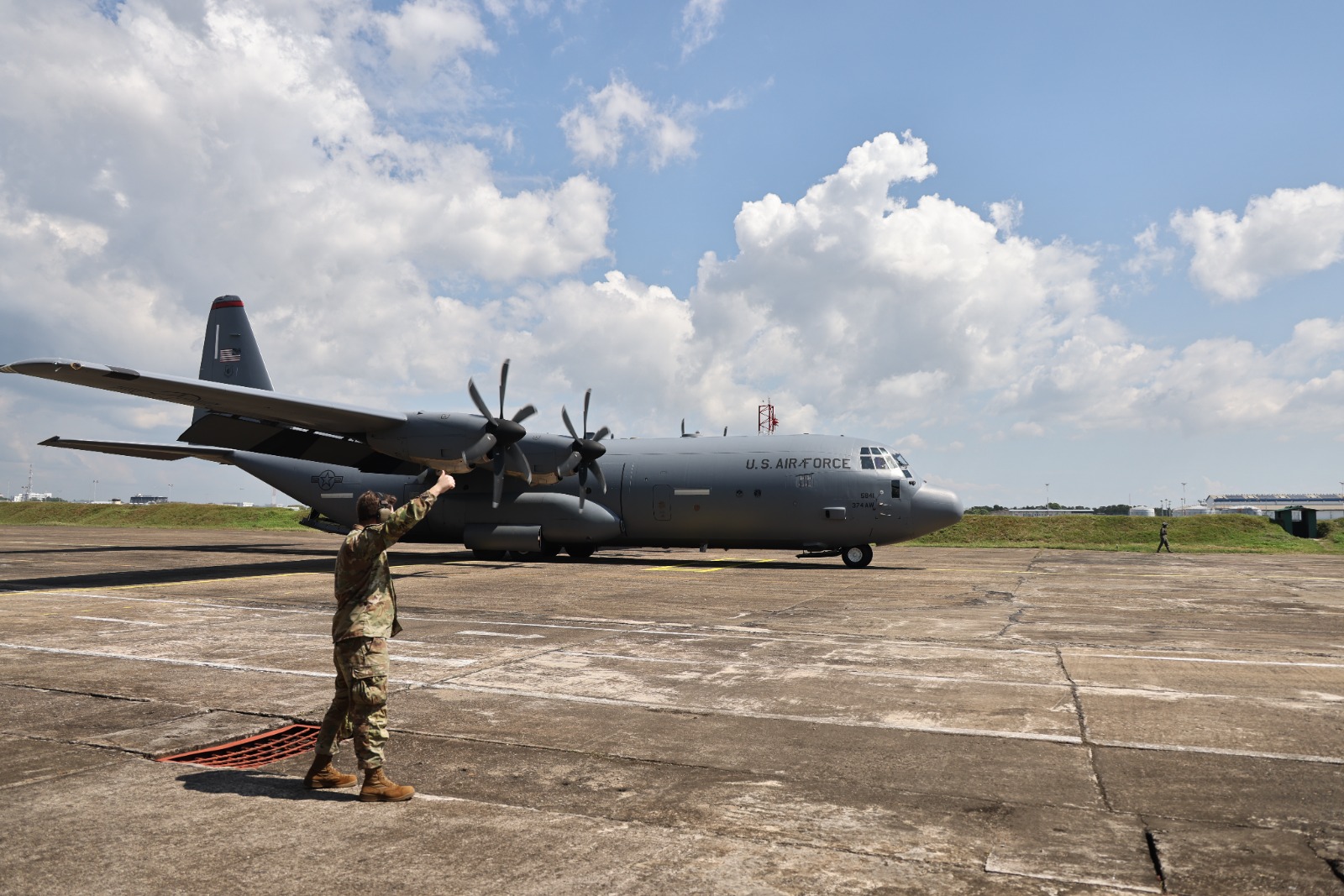 U.S. Air Force C-130J Super Hercules aircraft in Sri Lanka
U.S. Air Force C-130J Super Hercules aircraft in Sri Lanka
While past U.S. military deployments for emergency relief have often been conducted with minimal publicity due to geopolitical sensitivities, this week’s response to Cyclone Ditwah has been accompanied by extensive public messaging, embassy-issued photographs, and top-level diplomatic commentary.
The aircraft, deployed under U.S. Indo-Pacific Command, were welcomed at Katunayake Air Base by Ambassador Julie Chung and senior Sri Lankan officials. The Embassy’s announcement highlighted America’s “airlift and logistics muscle,” presenting the operation as a visible symbol of U.S. commitment to Sri Lanka.
The messaging stood in contrast to earlier instances such as disaster operations following floods or landslides over the past decade when U.S. air assets were deployed more quietly, sometimes without advance public disclosure.
Diplomatic observers note that the sudden emphasis on visibility comes at a time when major powers are intensifying humanitarian diplomacy across the Indian Ocean.
Sri Lanka’s strategic location makes disaster-relief optics a valuable tool for influence. Several analysts argue that the U.S. may be signalling greater operational transparency or strategic presence amid heightened competition with other regional actors.
The official narrative frames the deployment squarely as humanitarian. According to the U.S. Embassy, the C-130Js and personnel from the 36th Contingency
Response Group will provide rapid airlift to deliver shelter materials, sanitation supplies, medical aid, and food to cyclone-affected regions.
Additional support from the 374th Airlift Wing and the U.S. Marine Corps reinforces what officials call a “multinational, inter-service humanitarian partnership.”
Ambassador Chung praised Sri Lankan responders and underscored the urgency of logistics following severe damage to road infrastructure.
“The United States is here to take on some heavy lifting,” she said. Defense Attaché Matthew House emphasized that the mission builds on long-running military cooperation, noting that joint exercises have strengthened coordination for crises like Cyclone Ditwah.
Yet beneath the humanitarian partnership lies a broader geopolitical context. The public roll-out of this operation raises questions about why previous U.S. military-supported relief missions some involving aerial surveillance, airlift support, or operational planners received little or no publicity.
Officials who follow defense cooperation note that the U.S. typically keeps deployments low-profile to avoid triggering regional sensitivities,
but the robust public messaging in this instance suggests a shift: either an effort to demonstrate commitment to Sri Lanka, or an intention to maintain visibility in a crowded strategic theatre.
The United States has also recently provided SLAF with $2.1 million worth of airlift-support equipment fuel trucks, loading platforms, and ground-power units now deployed in the cyclone response. This accompanies the $2 million in humanitarian aid announced within 72 hours of landfall.
As relief operations continue, the high-visibility American deployment raises a new question: Is this transparency a one-off gesture for Cyclone Ditwah, or the beginning of a more assertive U.S. humanitarian footprint in Sri Lanka?
 U.S. Ambassador to Sri Lanka Julie Chung and Sri Lanka’s Deputy Minister of Defense Major General KP Aruna Jayasekara (Retd.) welcome U.S. Air Force Airmen at Katunayake Air Base
U.S. Ambassador to Sri Lanka Julie Chung and Sri Lanka’s Deputy Minister of Defense Major General KP Aruna Jayasekara (Retd.) welcome U.S. Air Force Airmen at Katunayake Air Base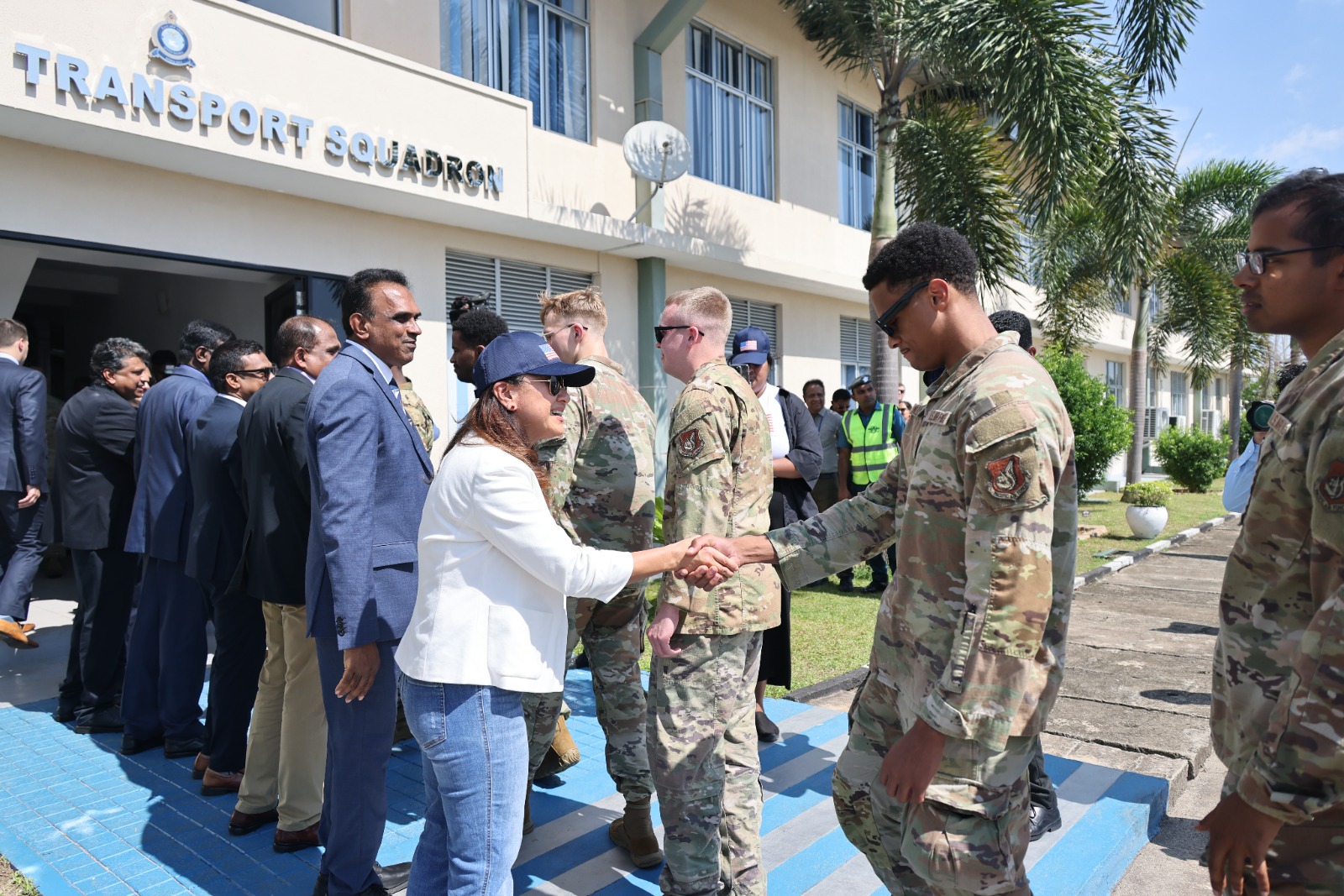
Page 37 of 659
